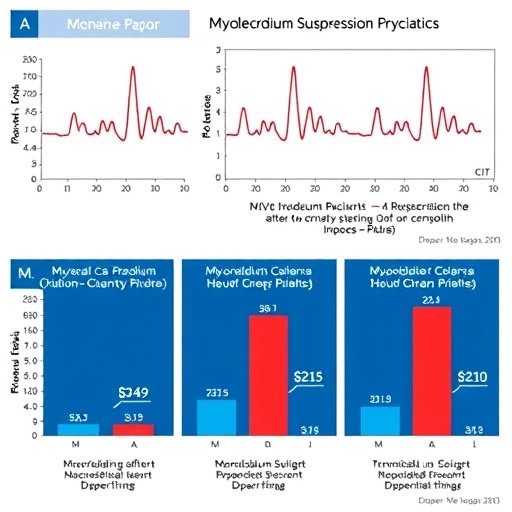In a groundbreaking case report, a team of researchers has documented the rare occurrence of severe myocardium suppression in two pediatric patients with congenital heart disease following the administration of remdesivir. This antiviral drug, initially developed for the treatment of viral infections such as Ebola and later repurposed for COVID-19, has now attracted attention due to its unexpected and concerning cardiovascular implications. The insights gleaned from this case present vital information for healthcare providers managing similar patients, highlighting the complexities involved in treating those with underlying cardiac conditions.
The report underscores the intricate interplay between viral infections and heart function, particularly in children already predisposed to cardiac abnormalities. These patients, already grappling with congenital heart issues, were given remdesivir as part of their treatment regimen against viral complications. However, the unforeseen side effects manifested as dramatic declines in heart function, raising critical alarms about the medication’s safety profile for vulnerable populations, particularly those with underlying cardiovascular challenges.
As the medical community continuously seeks effective treatments for viral infections, the findings from this case serve as a poignant reminder of the potential risks associated with even standard therapies like remdesivir. The researchers meticulously outlined the patients’ clinical histories, treatment processes, and the subsequent development of myocardium suppression—providing a detailed account that illuminates the complexities of managing comorbidities in pediatric patients.
Myocardium suppression refers to a reduction in the heart’s ability to effectively pump blood, a condition that can lead to various complications, including heart failure. In both patients, pronounced signs of myocardial distress were observed, including altered cardiac indices and clinical symptoms indicative of heart failure. These findings prompt a re-evaluation of the conventional understanding of remdesivir’s safety, particularly for children and those with pre-existing heart problems.
As the cases unfolded, the researchers employed various diagnostic tools, including echocardiograms and biomarkers, to assess the extent of cardiac involvement. The data collected revealed a significant decline in left ventricular function, which poses serious ethical questions regarding the administration of remdesivir to patients with congenital heart disease. The implications extend beyond these individual cases, indicating a need for additional research to thoroughly investigate the cardiovascular risks associated with remdesivir in pediatric populations.
The authors of the report call for heightened awareness among healthcare practitioners when prescribing antiviral treatments to children with congenital heart defects. This need for vigilance fosters a broader discourse about the importance of individualized care, particularly for patients with complex health histories. The documented cases urge clinicians to balance the benefits of antiviral treatment with the potential for severe adverse effects, ensuring that they are making informed decisions in the best interests of their patients.
It is worth noting that while the cases reported are alarming, they are also a critical doorway into exploring the multifaceted relationship between viral infections and cardiac health. Cardiologists and infectious disease specialists must collaborate to better understand these interactions and develop comprehensive treatment protocols that prioritize patient safety, particularly in high-risk groups.
Moreover, the report highlights a critical gap in knowledge regarding the pharmacodynamics of remdesivir in patients with pre-existing myocardium stress. The nuances of how antiviral medications interact with underlying cardiac conditions warrant further investigation, providing a foundation for future studies aimed at elucidating these complex mechanisms.
In this context, ongoing clinical trials and research initiatives must extend their scope to include cardiovascular monitoring and assessment in pediatric participants receiving remdesivir and similar antiviral therapies. Such efforts are fundamental to safeguarding patient health and aligning treatment protocols with emerging data on drug safety and efficacy.
As the research progresses, it becomes clear that the need for collaborative efforts in medical research is more urgent than ever. The intersection of infectious diseases and cardiovascular health presents an evolving challenge, urging professionals across specialties to unite in their approach to patient care.
In conclusion, while remdesivir has shown promise as an antiviral therapy, this case report serves as a stark reminder of the importance of vigilance in its administration, especially in pediatric patients with congenital heart disease. The findings call attention to the necessity for ongoing research that explores the broader implications of such treatments, ensuring that future therapeutic strategies are both effective and safe.
Furthermore, the medical community must strive to maintain an open dialogue, sharing insights and clinical experiences transparently, allowing for an informed consensus on how best to navigate the complexities of treating viral infections in individuals with compromised cardiovascular health.
As awareness grows regarding potential cardiac risks associated with antiviral treatments, it is imperative that healthcare teams remain proactive in both the research and clinical phases, fostering an environment where safety, efficacy, and patient-centered care are the cornerstones of therapeutic decision-making.
In the end, the report serves not only to alert healthcare professionals but also to advocate for comprehensive research, collaborative practices, and the continuous improvement of treatment methodologies to ensure that every patient—regardless of their complex health background—receives the safest and most effective care possible.
Subject of Research: Cardiac effects of antiviral treatment with remdesivir in pediatric patients with congenital heart disease.
Article Title: Severe myocardium suppression in two congenital heart disease patients after remdesivir use – a case report.
Article References: Lin, YF., Fang, SY., Huang, SC. et al. Severe myocardium suppression in two congenital heart disease patients after remdesivir use – a case report. BMC Pediatr 25, 934 (2025). https://doi.org/10.1186/s12887-025-06315-y
Image Credits: AI Generated
DOI: https://doi.org/10.1186/s12887-025-06315-y
Keywords: Myocardium suppression, remdesivir, congenital heart disease, cardiovascular health, pediatric patients, antiviral treatment, heart function.
Tags: antiviral drugs and cardiovascular risksantiviral treatment complications in childrencardiovascular implications of remdesivircase report on myocardium suppressioncongenital heart disease managementmyocardium suppression in pediatric patientspediatric patients with heart abnormalitiesremdesivir side effects in congenital heart diseasesafety profile of remdesivirtreating viral infections in congenital heart patientsunexpected medication effects in vulnerable populationsviral infections and heart function





